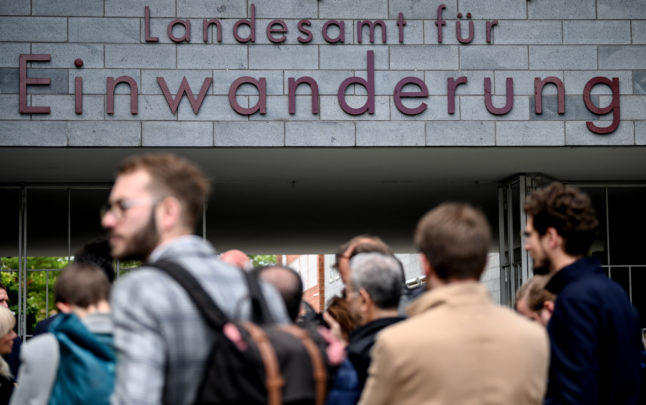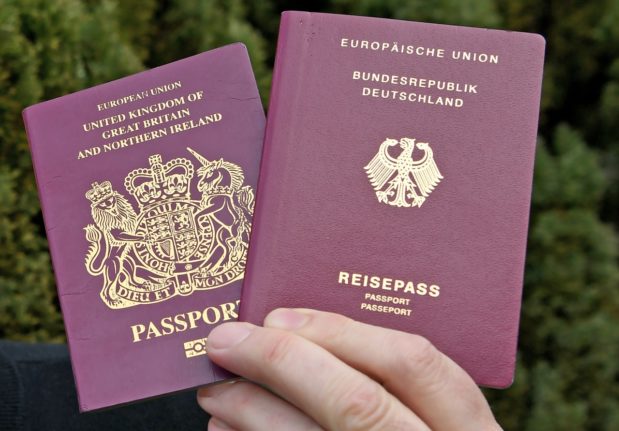Many more foreign nationals in Germany will soon qualify for citizenship after the law change.
But the question is: how long will the process take in notoriously slow and often understaffed German public offices?
“It will take absolutely forever,” says The Local reader Elizabeth, adding that the fact that it will be possible to get it “is the first step”.
It’s a view shared by many of our readers who are now eager to become German, while also feeling worried about the prospect of bureaucracy dragging on.
The draft law, which was approved by the Bundestag on Friday January 19th, reduces the time someone needs to have been resident in Germany before applying for citizenship from eight years to five, with some especially well-integrated people being able to naturalise in as little as three years.
Crucially though, it allows people naturalising as German to do so without giving up any previous passports they might hold – something previously required in principle for non-EU nationals.
Many long-time residents of Germany who have been here for years or even decades – are now expected to apply for German citizenship now that they can keep their original country’s passport. Over 50,000 applications are expected to come in almost right away from the country’s Turkish community alone.
READ ALSO:
- German parliament passes landmark dual citizenship reform
- KEY POINTS: What you need to know about Germany’s citizenship law reform
- ‘I’ll be proud to finally become German’: Foreigners react as dual citizenship law passes
Looking forward to citizenship – dreading the bureaucracy
Many Local readers also point out that allowing dual citizenship isn’t going to itself change what it’s like to deal with the bureaucracy of becoming German.
I think so but I am confident they will come up with something I have forgotten 😉
— Tessa | Discover Görlitz (@tessaapproves) January 19, 2024
American Rick Hoffman is bracing for a frustrating few years, having already spent the last year just preparing his documentation and agonising over when to apply as he waited for the Bundestag to approve the draft law, hoping to become German and keep his US passport.
“I’ve been saying for a while now ‘I’ll believe it when I see it,'” says Hoffman of the repeated delays in the expected timeline for passing the law over the last year. Ultimately, Hoffman decided to proceed with his application before the law passed, hoping it would come into effect before he hit the stage where he would have to renounce his American passport.
Although the Bundestag has now passed the law, it still needs to clear Germany’s upper chamber – the Bundesrat – and is expected to come into effect three months after that happens, to allow for the civil service to implement the changes. Parliamentarians working on the law expect it will come into effect by April or May, but that’s not yet confirmed.
I have got all the documents ready, and I'm worried genuinely about how long the processing will take in Berlin!
— Adithya (@adithya_srini) January 19, 2024
EXPLAINED: When and how can I apply for German citizenship?
Berlin’s citizenship nightmare
Berlin’s current backlogs are also adding to Hoffman’s worries.
“I have already been in this process for over a year. I know others who’ve been in it much longer. Since the changeover from Berlin applications being based at the district level to a centralised office, there is an extraordinary backlog,” Hoffman tells The Local. “All of us who did apply already through the district have been left in the dark and we have no idea what the status is of our applications.”
Application isn't a problem. Processing times are mad. I live in Berlin, and I'm scared to apply. Been living in Germany for ten years, and to wait three more years for the application to get processed is a nightmare in itself.
— Vic Ramkumar (@PolaritySwitch) January 19, 2024
While dual citizenship is something she never thought she’d see, American Caitlin Hardee says the wait is long enough to put a damper on some of the excitement.
“What use is it to be technically allowed to become a citizen after five years, if you know your application alone is going to take two to three years to be processed?” she asks. “I would be astonished to find myself holding a German passport before 2026.”
READ ALSO: How fast will Berlin’s new citizenship office process applications?
‘Worth the wait’
Some eligible applicants are more relaxed though.
“I think the benefit at the end is well worth the wait. We should be grateful to have the opportunity to live in a democratic country that is secure and viable, therefore the wait in my opinion, is okay,” says Joe Del Borrello, an Aussie-Italian dual who is starting his citizenship application to become German while retaining his Aussie passport.
“But I think Germany could look at some of the ways neighbouring countries are dealing with applications. Application times in many other places are significantly shorter and the process is more efficient.”
“I have residency until 2031 and I still have to do my citizenship exam – so I’m not in a huge rush,” says Anna Hartley, a Brit who moved to Germany before Brexit. Her husband and kids either have or are eligible for dual British-German citizenship due to being descended from victims of the Nazis, but Anna has been anticipating this law’s passage in order to apply to become German and still keep her UK passport.
“I’m looking forward to voting and to not being the only member of the family in the slow lane at the airport – but certainly not the wait!” she says. “But since this is the country we’ve chosen to make our home, it will be nice to really belong once the application does finally go through.”
READ ALSO: What documents should you get after obtaining German citizenship?
With additional reporting from Rachel Loxton



 Please whitelist us to continue reading.
Please whitelist us to continue reading.
Member comments